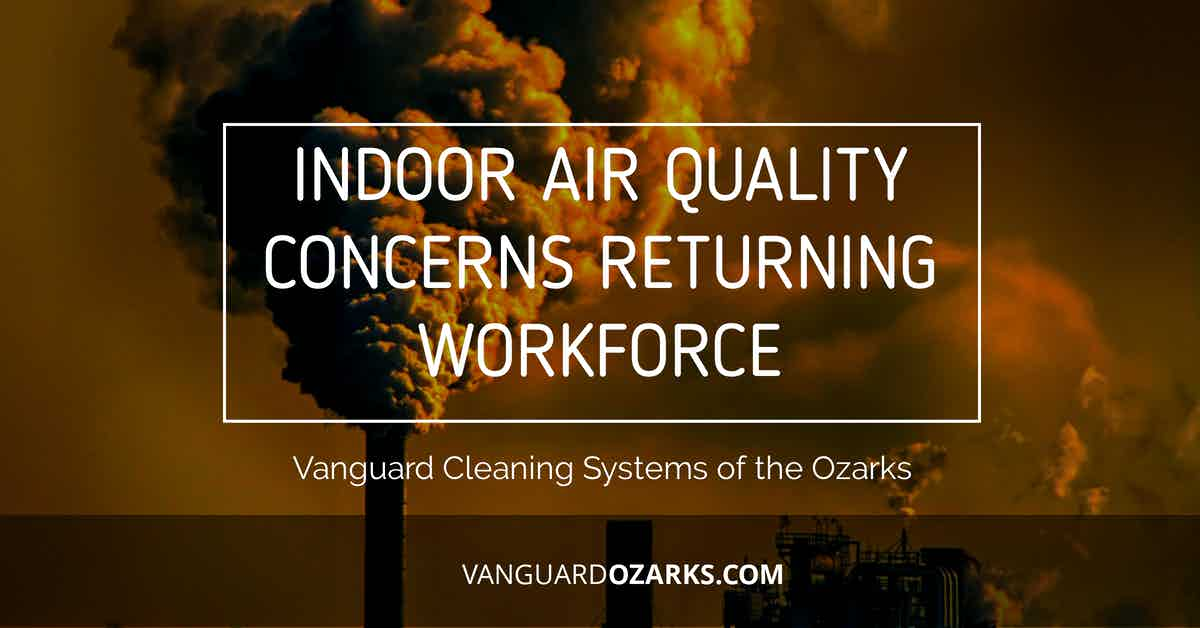A recent survey found that more than half of the U.S. labor force anticipates returning to work before the end of the year, prompting concerns regarding the quality of indoor air and how that may impact their health and safety.

Survey Shows Returning Workforce Concerned With Indoor Air Quality
A recent survey of more than 700 workers conducted by Aeroseal, LLC. revealed major concerns regarding the cleanliness of indoor air in a wide variety of workplace environments, including:
- Large and small offices
- Hospitals
- Schools
- Retail stores, and;
- Small Businesses
Key findings from the survey revealed that:
- 89% reported that they believe the air in their home is cleaner than at work.
- 42% will work in an office building, school, or healthcare facility when they return, and;
- 64% are worried about their health and safety when returning to work.
Additionally, the survey revealed nearly one-third of the returning labor force was more concerned with IAQ than surface cleanliness and hygiene.
- 27% are more concerned about the cleanliness of indoor air than they were the surfaces in bathrooms.
- 15% were more concerned with IAQ than the surface hygiene in meeting rooms, and;
- 9% were more concerned with IAQ than the cleanliness of elevators.
Addressing Facility IAQ
Indoor air quality is emerging as a necessary criterion for combatting the spread of SARS-CoV-2, as well as other airborne pathogens.
[... scientists are stressing the importance of proper building ventilation in preventing the spread of COVID-19, citing it is as important as social distancing, wearing masks and washing hands regularly.
A building’s HVAC system – the air conditioner, furnace, and ducts – must be working properly to prevent the spread.
A critical component of indoor air quality is a highly functioning HVAC system with clean, leak-free ducts.
Obstructed HVAC ducts with leaks lack the efficiency required to effectively move clean air in and out of classrooms, restrooms, and other occupied spaces within a facility, potentially exposing occupants to airborne pathogens and microbes.
All HVAC systems should be serviced on, at least, a yearly basis--more often if you live in an area exposed to high levels of dust, wind, rain, or smoke.
IAQ and Restrooms
One area directly related to COVID-19 prevention, high levels of IAQ, and customer satisfaction, is the restroom.
Numerous studies have shown that:
- Poorly maintained restrooms contribute to low hand hygiene compliance.
- Unsanitary bathrooms result in increased customer and workforce complaints, especially if they stink, and;
- Toilet plumes spread germs and have been tied to the transmission of SARS-CoV-2.
According to CleanLink;
Unpleasant odors indicate biological activity in the restroom.
The stronger the odor, the more bacteria are thriving and reproducing.
How did the bacteria get there?
You’re going to regret asking that question.
The moment a toilet is flushed, a fine mist of feces, urine, and bacteria flies into the air.
A June 2020 study suggests that these toilet plumes can also spread Coronavirus particles. O
ver the next couple hours, these particles will slowly settle on surfaces throughout the restroom.
If the last person who used the facility was ill, those contaminants may cause disease.
A proven method for addressing restroom sanitation and IAQ is the combination of day porter services, facility monitoring, enhanced no-touch cleaning, and nightly electrostatic disinfection.
This approach ensures restrooms are clean, stocked, sanitary, and not lowering building IAQ or contributing to the spread of disease.
Takeaway
It appears that the worst of the COVID-19 health emergency is behind us, but that means the task of cleaning up long-closed facilities and assuaging deep-seated fears among the returning labor force has just begun.
According to currently available information, the best methods for meeting workforce, student, and consumer demand is to:
- Demonstrate social responsibility through the application of high-performance enhanced cleaning and disinfection methods that are safe for long-term occupancy.
- Maintain high levels of indoor air quality through a combination of enhanced cleaning measures, as well as HVAC controls, and maintenance.
- Provide highly sanitary and well-supplied restrooms and hand hygiene stations that are regularly attended to, and;
- Clearly communicate these efforts to your facilities occupants, students, staff, and customers through whatever means necessary while encouraging them to observe local health and safety guidelines.
Contact us today and discover why Vanguard Cleaning Systems® is the Standard of Clean® for businesses throughout Northwest Arkansas, Missouri, and Oklahoma.
In Oklahoma, dial 918-960-4450
In Arkansas, dial 479-717-2410
In Missouri, dial 417-812-9777

